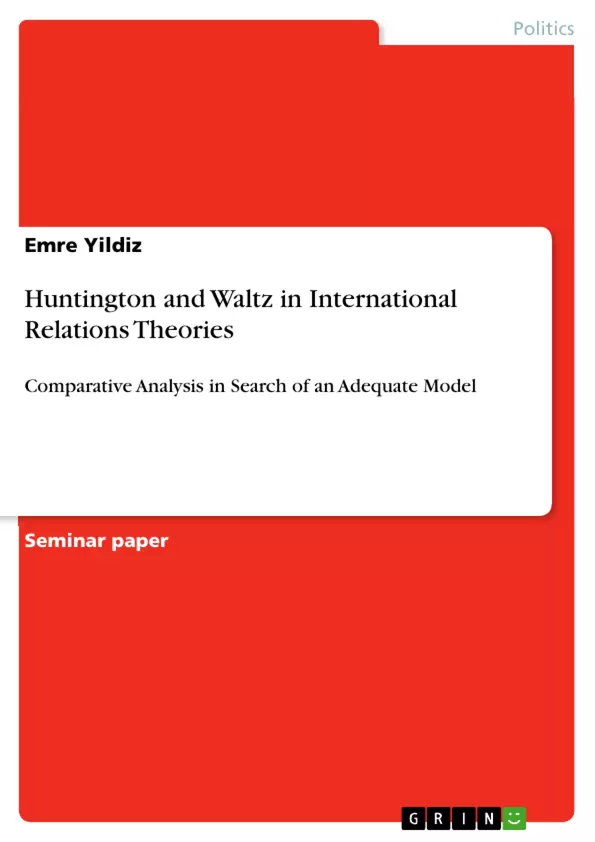A variety of theories were set forth to explain the way international politics works and give reasons why it does so. Among the contributors are Waltz and Huntington. However, both seem to have emphasized different factors as the decisive ones shaping politics and relations among nations. Hence, the question arises which view is more in line with reality with regard to contemporary politics.
In this paper I will consider the question of whether Waltz' or Huntington's explanation is more adequate when examining contemporary international politics. Since the publication of their theories date, relatively speaking, a long way back, this paper would examine the applicability in time of their explanatory power. For this purpose, I will proceed as follows: First, I will briefly summarize the main ideas of Waltz and Huntington. Second, by comparing them I will point out their similarities and differences, respectively. Third, I will give reasons why Huntington is more in accordance with current politics. Lastly, I will briefly summarize the findings and point to further research
Inhaltsverzeichnis (Table of Contents)
- Introduction
- Summary
- Similarities: Actors and Competition for Power
- Differences: Cooperation and Conflicts
- Evaluation: Question of Adequacy
- Concept of Identity
- Level of Analysis
- Conclusion
Zielsetzung und Themenschwerpunkte (Objectives and Key Themes)
This paper aims to assess the adequacy of Waltz's and Huntington's theories in explaining contemporary international politics. It examines the applicability of their theories to present-day circumstances. The paper compares and contrasts their perspectives, ultimately arguing for Huntington's model as a more relevant explanation. The key themes explored include:- The role of states as central actors in international politics
- Competition for power as a driving force in international relations
- The impact of shared identity and culture on international cooperation and conflict
- The influence of civilizations as a system-level factor in international affairs
- The applicability of Waltz's and Huntington's theories to contemporary events
Zusammenfassung der Kapitel (Chapter Summaries)
- Introduction: This section introduces the paper's objective, which is to analyze the adequacy of Waltz's and Huntington's theories in understanding contemporary international politics. It outlines the paper's structure and methodology.
- Summary: This section summarizes the main ideas of Waltz and Huntington, highlighting their perspectives on the dynamics of international politics. Waltz's view emphasizes the inherent violence in the international system, while Huntington focuses on the role of civilizations in shaping international relations.
- Similarities: Actors and Competition for Power: This section explores the similarities between Waltz's and Huntington's theories, particularly their shared view on states as central actors and the importance of competition for power in international politics. It also discusses how their perspectives differ in terms of the context and scale of this competition.
- Differences: Cooperation and Conflicts: This section examines the key differences between Waltz's and Huntington's theories, focusing on their contrasting views on cooperation and conflict. It highlights Waltz's focus on rational self-interest and the challenges of cooperation in a system of anarchy, while Huntington emphasizes the role of shared identity and cultural differences in driving international relations.
- Evaluation: Question of Adequacy: This section begins the evaluation of the two theories by examining the adequacy of Huntington's model in explaining contemporary international politics. It argues that Huntington's concept of identity and his inclusion of civilizations as a system-level factor provide a more comprehensive understanding of current events.
- Concept of Identity: This section delves into the importance of identity and cultural factors in shaping international relations, arguing that Huntington's framework provides a better explanation for contemporary events like the Turkish-Azerbaijani alliance and the Balkan War of 1992/93.
- Level of Analysis: This section emphasizes the significance of Huntington's inclusion of the civilization level as a system-level factor in international politics. It argues that this framework provides a more nuanced explanation for phenomena like the successful establishment of the Economic Cooperation Organization (ECO) and the failed attempt to create a Caribbean-Central American economic platform.
Schlüsselwörter (Keywords)
This paper delves into the influential theories of Kenneth Waltz and Samuel Huntington on international relations. The key concepts and themes explored include anarchy, self-help, the international system, civilizations, identity, culture, competition for power, cooperation, conflict, and the role of states as central actors. It analyzes contemporary events in international politics to assess the applicability of Waltz's and Huntington's theories.Frequently Asked Questions
How do Waltz and Huntington differ in their international relations theories?
Kenneth Waltz focuses on the structural anarchy of the state system and rational self-interest, while Samuel Huntington emphasizes cultural identity and civilizations as the primary drivers of conflict and cooperation.
What is the central actor in Waltz's theory?
For Waltz, the state remains the central actor in an international system defined by self-help and competition for power.
Why does Huntington use the concept of "civilizations"?
Huntington argues that in the post-Cold War world, conflicts occur along cultural "fault lines" between major civilizations rather than just between individual nation-states.
Which theory does the paper find more adequate for today's world?
The paper argues that Huntington's model is more in accordance with current politics because it better explains events driven by identity, such as the Balkan wars or regional alliances based on shared culture.
What are the similarities between the two theories?
Both authors agree that states are central actors and that the competition for power is a fundamental driving force in international relations.
- Quote paper
- Emre Yildiz (Author), 2012, Huntington and Waltz in International Relations Theories, Munich, GRIN Verlag, https://www.grin.com/document/231986



